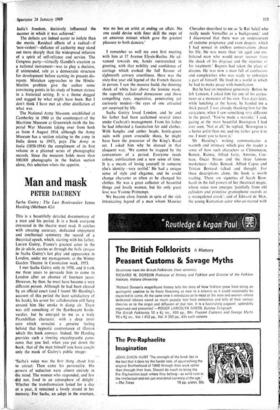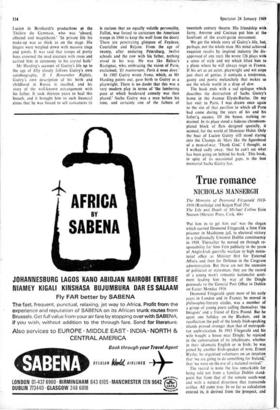Man and mask
PETER DAUBENY
This is a beautifully detailed documentary of a man and his period. It is a book everyone interested in the theatre must read. It catches with amazing accuracy, dedicated enjoyment and intellectual symmetry the record of a theatrical epoch, which, starting with his father, Lucien Guitry, France's greatest actor in the fin de siècle, carries us through the belle époque to Sacha Guitry's last play and appearance in London, under my management, at the Winter Garden Theatre in Coronation week, 1953.
I met Sacha Guitry only in 1950, and it took me three years to persuade him to come to London after an absence of fourteen years. However, by then, he must have become a very different person. Although he had been cleared by an official court (and I found Mr Harding's account of this period the least satisfactory of his book), his arrest for collaboration still hung around him like smoke in damp air. There was still something of the flamboyant boule- vardier, but he emerged to me as a truly Pirandellian character, with a deep inner core which revealed a genuine feeling behind that hypnotic countenance of illusion which this book conveys. Indeed, Mr Harding provides such a riveting encyclopaedic pano- rama that you feel, when you put down the book, that of the man himself you have caught only the mask of Guitry's public image: `Sacha's voice was the first thing about him to attract. Then came his personality. His -powers of seduction were almost entirely in the mind. The women who responded, and few -seid not, lived in an atmosphere of delight, Whether the transformation lasted for a day or a year, it remained a lovely strand in her memory. For Sacha, an adept in the overture,
Was no less. an artist at ending an affair. No one could devise with finer skill the steps of an amorous minuet which gave the greatest pleasure to both dancers.'
I remember so well my own first meeting with him at 17 Avenue Elysee-Reclus. He ad- vanced towards me, hands outstretched in greeting, with that nobility and confidence of carriage which evoked the full flavour of eighteenth century courtliness. Here was the sixty-five year old legend of the French theatre in person. I saw the massive build, the thinning shock of white hair above the leonine mask, the superbly calculated demeanour and those compelling eyes, inquisitive, penetrating yet curiously modest—the eyes of one attracted yet surprised by life.
Sacha Guitry loved London, and he and his father had been acclaimed several times under Cochran's management. From his father he had inherited a fascination for odd clothes. With bangles and amber beads, bottle-green suits with green crocodile shoes, he might have been the precursor of the King's Road set. I asked him why he dressed in that eloquent way. 'We cannot be trapped by the conventions of a period. Everyone needs colour, exhilaration and a new sense of time. It is a means of losing yourself in someone else's identity—very restful.' He had a unique sense of style and elegance,- and he could change character as often as he changed his clothes. He was a great collector of beautiful things and lovely women, but his only great love was Yvonne Printemps.
We became close. friends in spite of the rich intoxicating legend of a man whom Maurice
Chevalier-described to me as 'le Roi Soleil who really needs Versailles as a background,' and I discovered that there was an undercurrent of extreme poignancy and even despair, which I had sensed in endless conversations about his life. He was more than 'an aged and em- bittered man who would never recover from the shock of his disgrace and the injustice or his treatment.' Regrets had taken the place of dreams. He was now a man full of confusions and complexities who was ready to unbOrden a part of himself. He lived in a world in which he had to make peace with humiliation.
But be had an impulsive generosity. Before he left London, I asked him for one of his carica- tures as a memento of his visit. Two days later, while lunching at the Savoy, he handed me a thick parcel. I was already thanking him for the caricature, when I saw something very different in the parcel. 'You've made a mistake,' I said, gazing at the most beautiful Bonington I had ever seen. 'Not at all,' he replied, 'Bonington is a better artist than me, and my father gave it to me. I want you to have it.'
Mr Harding's writing communicates a warmth and intimacy which give the reader a sense of how such characters as Clemenceau, Renoir, Raimu, Alfred Jarry, Antoine, Coc- teau, Oscar Straus and the three famous musketeers—Jules Renard, Alfred Cactus. and Tristan Bernard - talked and thought. For these descriptions alone, the book is worth reading. There are vignettes of Sarah Bern- hardt in the full powers of her theatrical magic, whose voice now emerges 'painfully from old cylinders and primitive gramophone records as a strangulated croak'; and of Edward de Max, the young Rumanian actor who co-starred with
Lucien in Bernhardt's productions at the Theatre du Gymnase, who was 'absurd, affected and magnificent.' In private life his make-up was as thick as on the stage. His fingers were weighed down with massive rings and jewels. It was said that troops of pretty boys crowned the mad creature with roses and carried him in ceremony to his crystal bath.'
Mr Harding's account of Guitry's life up to the age of fifty closely follows Guitry's own autobiography, If I Remember Rightly. Guitry's own description of his birth and childhood in Russia is recalled, and his story of the well-known estrangement with his father. It took thirteen years to heal this breach, and it brought him to such financial stress that he was forced to sell caricatures (it
is curious that an equally volatile personality, Fellini, was forced to caricature the American troops in 1944 to keep the wolf from the door). There are penetrating glimpses of Feydeau, Courteline and Rejane. From the age of twenty, after enduring Petersburg, twelve schools and the row with his father, nothing stood in his way. He was like BaIzac's Rastignac, who, embracing the vision of Paris, exclaimed, 'Et mainlenant, Paris d nous deux.'
In 1905 Guitry wrote Nono, which, as Mr Harding points out, gave birth to Guitry as a playwright. There is no doubt that this was a very modern play in terms of 'the lumbering pace at which boulevard comedy was then played.' Sacha Guitry was a man before his time, and certainly one of the fathers of twentieth century theatre. His friendship with Jarry, Antoine and Cocteau put him at the forefront of the avant-garde movement.
We get the whole story of Guitry's life, but, perhaps, not the whole man. His mind achieved exquisite results by inspired industry (he dis- approved of any rest). He wrote 126 plays with a sense of style and wit which lifted him to a plane where he will always reign in France. If his art as an actor, playwright and wit stops just short of genius, it contains a tenderness, gaiety and poetic melancholy that makes us see the whole world in a drop of dew.
The book ends with a sad epilogue which describes the destruction of Sacha Guitry's home in the Avenue Elysee-Reclus. On my last visit to Paris, I was drawn once again to the site of that pavilion to which all Paris had come during the years of his and his father* success. Of the house, nothing re- mained. In its place stood a hideous chromium- plated block of flats designed specially, it seemed, for the world of Monsieur Hulot. Only the bust of Lucien Guitry still stood staring into the Champs de Mars like the figurehead of a man-of-war. 'Thank God,' I thought, as I walked sadly away, 'that he can't see what has been going on behind his back.' This book, in spite of its occasional gaps, is the best memorial Sacha Guitry has.



































 Previous page
Previous page